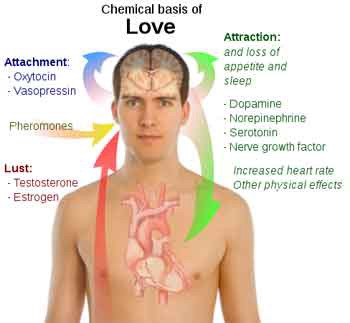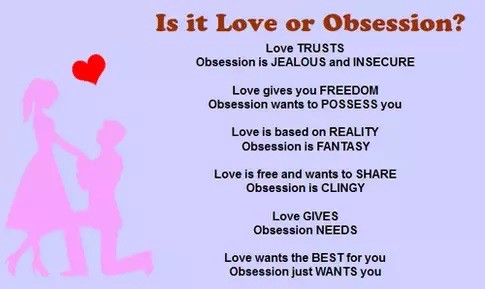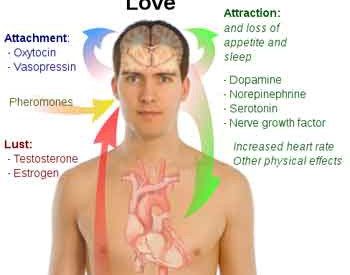Love is a healthy emotion that grows between two people once they?ve invested time and energy into getting to really know one another, flaws, pet peeves and all. Obsession is different. In the beginning it may feel a lot like love. It makes your heart race and you can think of almost nothing else except the other person. Obsession is an unhealthy emotion that becomes more and more suffocating over time.
When two people fall in love, they maintain their individual identities and interests. They are not threatened when their partner elects to spend time with family or friends without always including them. They are happy for and proud of their partner?s accomplishments, even when those accomplishments are exclusive of the relationship. With obsession, it becomes nearly impossible to be without one another. The obsessive partner feels a physical need to be with the object of their obsession every day and to know exactly where they are and who they are with whenever they are not together. Negative feelings such as jealousy and paranoia begin to creep into the relationship. The obsessive individual suspects that their partner may be cheating or that everything they do or say is somehow a reflection of how they feel about them.
An obsessive person will spend inordinate amounts of time trying to please their partner in an ongoing effort to assure that the partner does not want to cheat on or leave them. They may place multiple phone calls, send countless texts or emails all in one day. They may write poems or songs to the object of their obsession. They make attempts to spend every unoccupied moment with them, often making plans well in advance to assure that every moment can be accounted for. They limit the other?s ability to spend time with family or friends and become angry and jealous when they do choose others over them.
Often, an obsessive person can become verbally or physically abusive and express great amounts of remorse afterward, yet they consistently blame their partner for bringing on the abuse themselves. Over time, they reduce their partner to a helpless, dependent individual that is a mere shell of the person they supposedly fell in love with. This is done in a subconscious attempt to maintain control over their partner.
The individual who becomes involved with an obsessive partner can grow to realize it, but it is often well after the relationship grows out of control, though in most cases, that doesn?t take too long. Once that has happened, it becomes harder to extricate oneself from the relationship, especially without much guilt and possibly danger. In extreme cases of obsessive love, the obsessive partner may subject their lover to verbal or physical abuse, rape, stalking or even murder.
How to spot obsession?
- Inability to apply reason and logic to the relationship. (i.e. you know you are pretty incompatible but you choose to ignore the obvious signs)
- Paranoia exists about possible infidelities, especially when you are not together. Over time, the paranoia may become even more illogical
- Driving by a partner?s home, office or other frequented places hoping to catch a glimpse of them or catch them with someone else to validate feelings of paranoia.
- Inability to focus on anything else, including work, because the obsessive relationship occupies all thoughts and consumes copious quantities of time. This might mean that even while at work one constantly tries to reach their partner by phone, sends emails, daydreams, writes poetry, takes long lunches to buy gifts or to stalk their lover, etc.
- Feelings of confusion (i.e. I know I can?t possibly be in love with them, but when why can?t I imagine life without them?)
- Loss of sleep and appetite. Increasing feelings of anxiety and depression.
- Feelings of extreme depression and low self-esteem brought on when the relationship begins to suffer strains. This happens to individuals who allow their entire identify to become wrapped up in the relationship.
- Inability to accept the end of the relationship. May believe that your partner really can?t live without and still loves you even when they refuse to take your calls, ask to be left alone or even seek restraining orders.
- Belief that if you continue your stalking or obsessive behaviors, they will realize that they still love you and will take you back.
- Manipulation of a lover through guilt tactics.
- Dulling pain through use of drugs, alcohol or other self-destructive behaviors as feelings of rejection and depression become more frequent.
- Promises to change oneself to please the partner. This may mean anything from changes in behavior, to changes in appearance, habits, interests, etc. At times, changes may even become apparent, but they are not likely to be lasting, so beware of such tactics.
Love is a feeling from the heart, and obsession can be termed as a crazy feeling. Though love and obsession are related in some aspects, the two can never be thought to be the same.
Love is a feeling that is uncontrollable, and a feeling which one has for another person. Love always means caring, supportive and giving. On the other hand, obsession is only a crazy idea where a person cannot think in an affectionate manner.
Love is a feeling when a person wants the best for the one he loves, and always wants them to be happy, even if they are not part of his life. On the other hand, obsession is a crazy feeling where the person wants the other to be his or her?s only. An obsessed person always thinks of having the beloved one on his or her side all day.
 Chemical basis
Chemical basis
One may give more importance to the other?s needs when in love. For the person who is in love, the other?s needs are given prominence. Whereas, an obsessed person gives more importance to his or her needs. Love is something that makes one feel good. Obsession makes one look like an idiot.
It can be said that love has no limits or boundaries. In love, there is complete freedom. Well, obsession is something that has its own limitations, and it is a condition where one feels like they have no freedom.
Obsession is also shrouded with jealousy. On the other hand, love is always pure, and it is the understanding between individuals. Persons who are in love, trust each other blindly. On the contrary, an obsessive person will always want to know every detail about the other person. This only means that an obsessive relationship lacks trust.
 Love vs obsession
Love vs obsession
Summary:
1. Love always means caring, supportive and giving. Obsession is only a crazy idea where a person cannot think in an affectionate manner.
2. One may give more importance to the other?s needs when in love. Whereas, an obsessed person gives more importance to his or her needs.
3. Love has no limits or boundaries, and there is complete freedom. Well, obsession is something that has its own limitations, and it is a condition where one feels like they have no freedom.
What causes obsessive love?
The process that mental-health professionals engage in to assess obsessive love includes evaluating the person to ensure that mental disorders that may present with this symptom are considered and treated if present. Examples of some such disorders include schizophrenia, bipolar disorder, delusional disorder, obsessive compulsive disorder, a personality disorder, or organic (caused by a medical condition) brain syndrome. Warning signs that someone is suffering from obsessive love may include the following:
- Low self-esteem/a tendency of needing excessive reassurance
- Obsessively talking about their loved object
- Making repeated calls, texts, and/or faxes to the love object
- Unwanted intensive attention to the love object
- A tendency to have extremely good or bad (not balanced) feelings about someone
- A tendency to focus on only the positive or the negative aspects of their loved one
- Trouble focusing on work, recreation, socializing, or other aspects of their lives outside of the object of their affection
- Attempts to monitor or otherwise control their love object?s life and activities
- Excessive joy, to the point of relief, when able to get in touch with or be with their love object
What is the treatment for obsessive love?
Treating obsessive love often involves psychotherapy. Any underlying mental illness should be treated with medication if appropriate.


